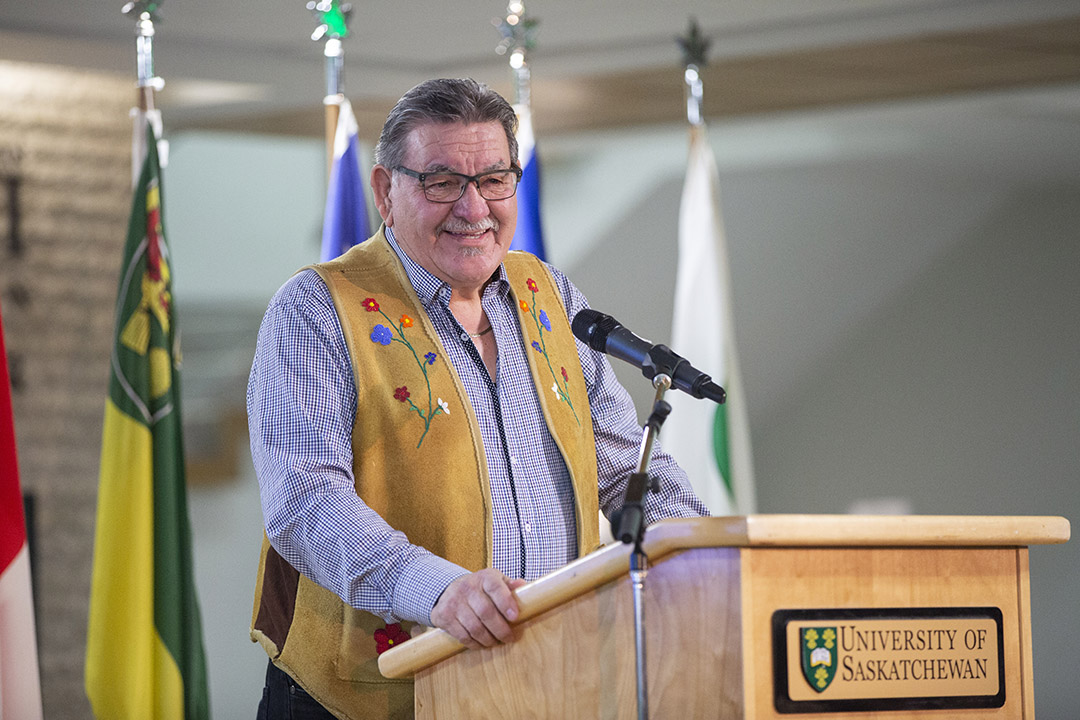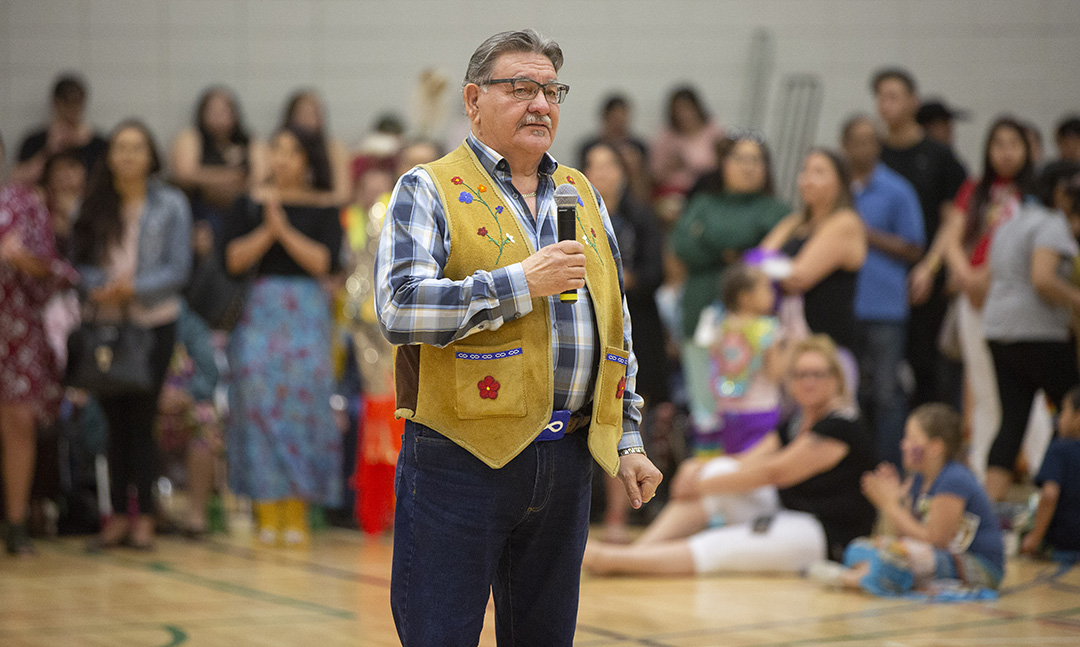
Elder preserving Michif language through USask's College of Education
On Elder Norman Fleury’s office door in the College of Education hangs a sign with bright blue letters and the Michif word piihtikway, meaning “Come in, you are welcome here.”
By Meagan HintherSince joining the University of Saskatchewan (USask) in 2015 as a special lecturer and Michif advisor in the college’s Department of Curriculum Studies, Elder Fleury has been integral in the continued creation of a welcoming space where Indigenous knowledge and contributions are valued.
“There is one thing I’ve always done while I’m there: keep my office door open. I’ve had so many people walk by and say ‘good morning’ and we end up having a visit. I have lots of interactions with students, with staff, with faculty,” said Fleury.
Though the face-to-face interactions are not happening now, he is as busy as ever—speaking with colleagues and community leaders over the phone, attending virtual meetings, and conducting interviews with news outlets across the country. Fleury moves seamlessly between languages and is fluent in Michif, Cree, Dakota, Anishinaabemowin, French and English, and is dedicated to preserving the Michif language in spoken word and in print:
“Norman Fleury dishinihkaashoon aen Michif niiya ma laang Michif. giinihtaawakin pi gii oohpikin niikinaahk daan nutr pchit farm namooya wahyow ooshchi St. Lazare, Manitoba. ita kaa wiikiyaahk li Michif gii piikishkwaanaan niikinaahkinaan pi aan Michif gii ishipimaatishinaan.”
Fleury was born on a small farm near the Métis community of St. Lazare, Manitoba. Where he lived they spoke Michif and lived the Michif ways. As he grew older, he was chosen by his family to preserve the language and knowledges of his people.
“When my grandparents were getting older they said ‘Norman, we’re going to leave this for you, and you’re going to be the person that takes it on.’ That’s the sanctioning, the blessing. Not everybody gets that blessing,” said Fleury.
Fleury’s maternal grandparents Flora (LePine) LeClerc and Jean Baptiste LeClerc recognized his gift with the Michif language, and helped foster in him a deep emotional connection to what it means to be Michif and the cultural protocols involved. He compares it to the training that happens at the university—the knowledge built and the degrees awarded.
As a child, Fleury helped his grandmother in many ways, by picking medicines, fishing, trapping, baking, and doing all of this in the Michif language. Never was a word of English spoken.
“It’s like I went to school all those years and my grandparents were my professors,” Fleury shared. “They recognized that I had the gift to be able to speak it and talk about it and carry it on. That’s how we’re chosen. You have to be able to recognize that and say ‘I’m ready.’”
Preserving a family oral language

In the 1980s and 1990s, Fleury embarked on a journey to preserve the Michif language, working closely with others across the continent.
“When I grew up I never thought that we could write my Michif language. We’re an oral cultured people,” said Fleury, noting that the language has been passed down for generations through song, dance, protocols and traditions. “As Métis and Michif people, we aren’t European and we’re not First Nations. We’re not all trappers.
We were buffalo hunters, but we also farmed, we also preserved, we also made gardens. We’re a very special people.”
Protecting and revitalizing the Michif oral language so that it may be taught and passed on has involved many dedicated people over the years, some of whom were born and raised Michif and others who were drawn to the uniqueness of the only known language that stems from two distinct family groups—predominantly French and Cree.
Fleury speaks passionately of the hard work of the pioneering linguists, community leaders, Elders and Knowledge Keepers who were involved, across the Prairies and the northern United States.
“About 40 years ago, Patline Laverdue and Ida Rose Allard worked with linguist John Crawford in North Dakota to create—for the first time ever—a Michif dictionary using the Turtle Mountain North Dakota writing system,” he said.
Fleury explained how the pioneering work of developing the writing system happened through the efforts of many. Conferences were held and people were brought together to preserve the language.
“For example, we had a conference in Yorkton, specifically talking about heritage Michif. In attendance were Michif language speakers, Knowledge Keepers and community Elders,” said Fleury. “They could speak the language, knew all the history, the stories, all these things that make up the Michif language, but because we’re an oral people, most couldn’t read or write it.”
“The late Rita Flamand and I adapted the Turtle Mountain writing system and created a double vowel writing system suggested by linguist Peter Bakker to reflect our heritage Michif. We were then able to document their stories,” Fleury added.
Over the years, he has authored and translated more than 20 resources including the comprehensive Canadian Michif Language Dictionary, language guides and numerous children’s books. For him, it is much more than the science of analyzing language and developing syntax.
“It’s easy to have a grammatical term for ‘Hello, how are you?’ But it’s more than that. There’s protocols in the language. It’s the understanding of the spiritual connection to the language and to the land and the land-based teachings,” said Fleury.
Joining the College of Education
Six years ago, Fleury joined the college with a focus and passion to promote, protect and revitalize the Michif language.
“We’re creating a family,” Fleury said. “We’re working together in a good way.”
Having served as special lecturer for and advisor to the College of Education, Fleury has taken part in teaching classes, offering workshops, speaking at events, engaging in partnerships, working in schools, and contributing to committees and initiatives. All of these have a role in advancing the preservation of Michif traditions, history, song, dance and stories. Most recently, Fleury has been working with others in the college on the development of the Michif Language Certificate. He was also a key contributor to the development of new Bachelor of Education streams in Cree and French, called the Language Teacher Education Program.
“Elder Fleury has been instrumental in moving not only the College of Education, but the entire USask community to a deeper understanding of Michif culture and language,” said Dr. Jay Wilson (EdD), head of the Department of Curriculum Studies. “He engages in his activities with unparalleled passion and dedication. He recognizes the opportunity to have honest conversations about culture and views his role as one of responsibility and leadership. I consider it a great honour to work with and learn from him.”
For Fleury, the development of the Michif Language Certificate brings an important language piece to the education of Métis students in the Saskatchewan Urban Native Teacher Education Program (SUNTEP), a program delivered in partnership with the Gabriel Dumont Institute. In addition to language pedagogies, the courses are focused on teaching about Métis cultural protocols, food, celebrations and belief systems.
“I’m happy to be there at the College of Education,” said Fleury. “For me, it’s always about what can we bring to the table for our students? Those 1,500 SUNTEP students that have graduated and couldn’t take their own language? Now Michif will be offered as an accredited course.”
Métis and Michif presence at USask

More broadly, Fleury is helping further the relationship and initiatives that were outlined in the Memorandum of Understanding (MOU) signed by President Peter Stoicheff and Métis Nation-Saskatchewan President Glen McCallum in November 2019. He also sits on various university committees.
“As a distinct people, we want to make sure that the Métis and Michif presence is heard, valued and respected at the university,” said Fleury. “Through the MOU, we are developing a process to accommodate Métis students at the university, building their confidence in their heritage while motivating them to succeed in their education and professions.”
Fleury speaks of the opportunity and responsibility that everyone at the university has to work towards a future that is beneficial for all and that creates a safe place to learn, share, work, celebrate and live together.
“We all have a responsibility to educate ourselves and our children to have a balance of life and worldviews,” said Fleury. “As long we are working towards common goals and an understanding of the values and experiences of others, we will move closer to that place of balance.”

